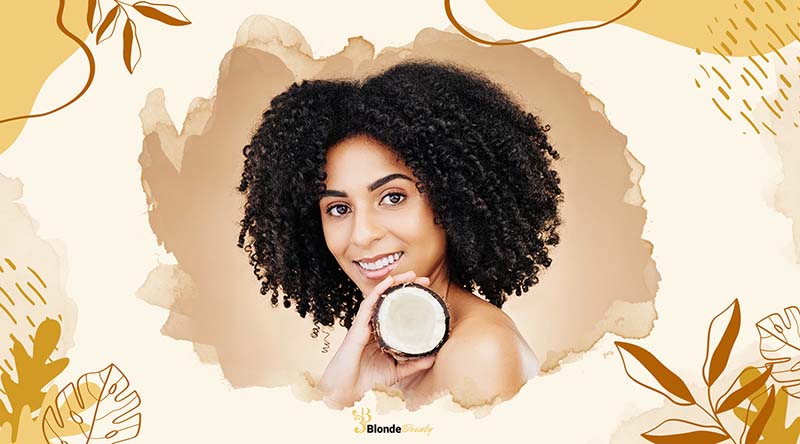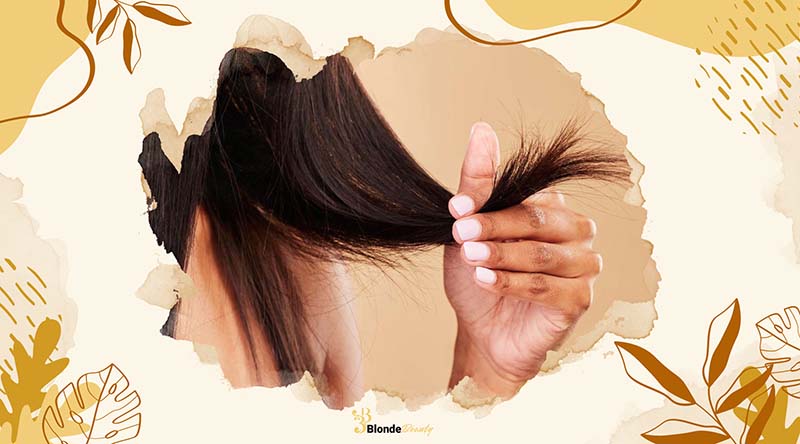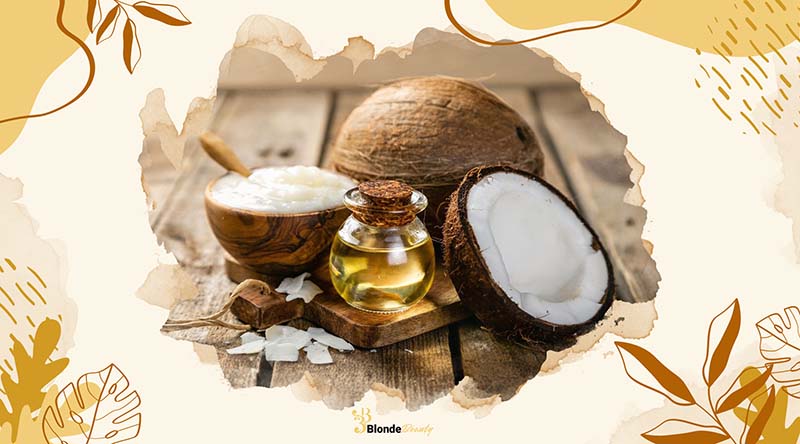Curly hair care is crucial for those with wavy, curly, or coily textures. Curls demand specialized attention and specific products to maintain their health.
This blog explores how understanding and addressing the unique challenges of curly hair can enhance its natural beauty. In this blog, we will explore the main question: Is coconut oil good for curly hair? and how it can benefit those with natural curls.
Is Coconut Oil Good for Curly Hair?
Coconut oil is one of the best additions to your hair care regimen. Whether you apply it directly to dry strands or use shampoo and conditioner infused with it, you can reap its amazing benefits.
Deep Moisturization
Curly hair is often dry. Coconut oil penetrates deep into the hair follicles, moisturizing from the inside out. This leaves your curls looking luscious and silky to the touch.
Frizz Fighting
The moment you step outside, your perfectly coiled curls might turn into chaotic strands. Coconut oil acts as a shield against frizz, smoothing the hair cuticle and taming unruly flyaways.
Added Strength
Coconut oil strengthens your hair, making it more resilient and less prone to damage. This means healthier, shinier, and more vibrant curls that can withstand whatever life throws your way.
Curl Definition
Tired of spending hours shaping your curls? Coconut oil helps define your natural curls without all the fuss.

Uses of Coconut Oil for Your Hair
While there’s no conclusive research showing that coconut oil can make your hair grow faster, it does improve hair and scalp health, which can make hair look healthier and potentially appear to grow faster.
Fights Fungal Infections
Healthy hair begins at the root. Keeping your scalp healthy can support better hair growth. A recent lab study found that coconut oil can help eliminate certain types of fungal infections. Coconut oil may help heal or prevent dandruff and other fungi on the scalp. More research is needed to confirm these benefits for the skin and scalp.
Calms Irritation
Coconut oil is a natural saturated fat with a high fat content that can help calm scalp irritation, flaking, and itching. The fat in coconut oil also helps seal in hair moisture, improving overall scalp health.
Treats Split Ends
A 2015 review noted that coconut oil absorbs into hair strands better than mineral oil and other oils, helping prevent hair breakage and split ends. Regular use of coconut oil can reduce the need for frequent trims, making hair seem like it’s growing longer, faster.
Another review on the uses of coconut oil in India found that it helps reduce protein loss in hair, preventing dry, brittle, or breaking hair. In India, coconut oil is used both as a hair mask before showering and as a leave-in conditioner after showering.

Protects from Heat Damage
Using a small amount of coconut oil on wet hair before drying or heat styling can protect hair from water and heat damage. Hygral fatigue occurs when hair swells from too much water, which can damage or break the hair. Coconut oil helps reduce this swelling, preventing hair from becoming drier and weaker over time.
Popular Ways to Combine Coconut Oil
Coconut oil is one of the most versatile hair care oils and can work wonders as a pre-shampoo treatment, conditioner, styling aid, or mask. Here are five simple ways to revitalize your hair care routine with coconut oil:
Prewash Protector
When applied before shampooing, coconut oil can prevent your hair from absorbing too much water, helping to stave off damage and dryness. Try applying coconut oil about 15 to 30 minutes before you wash your hair, focusing on the midsection and ends.
Conditioner
Coconut oil can help strengthen the hair shaft and prevent breakage. You can use it as an alternative to standard conditioners or add a few drops to your usual conditioner to boost its smoothing effect.
Styling Aid
A dab of coconut oil can go a long way in taming frizz. For easier absorption and styling, apply the oil to damp hair. This helps manage flyaways and adds shine.
Hair Mask
For a super-nourishing hair treatment, massage a teaspoon or two of coconut oil through your hair. Wash it out after a few hours or leave it on overnight if you have extra dry or damaged hair. This deep conditioning treatment can leave your hair feeling soft and revitalized.
Sun Protection
In addition to other uses, coconut oil may help protect your hair from sun damage caused by ultraviolet light exposure. While more research is needed, applying a small amount of coconut oil can offer some protection against the sun’s harmful rays.

Tips for Using Coconut Oil in Hair Care
Here’s the best way to apply coconut oil for optimal results:
- Choose Raw Coconut Oil: Use raw, unrefined coconut oil to ensure you’re getting the purest form with all its natural benefits.
- Smooth Onto Hair: Apply the coconut oil to dry hair. Start by smoothing a small amount onto your hair and use a comb to distribute it evenly, focusing on the midsection and ends.
- Absorption Time: Leave the coconut oil on for at least 15 to 30 minutes to allow it to absorb thoroughly into your hair.
- Thorough Washing: Wash your hair thoroughly with a good shampoo. You may need to shampoo twice to remove all the oil. Follow up with your usual conditioner to ensure your hair feels clean and soft.
Reasonable Frequency of Using Coconut Oil for Hair
Research studies find that applying coconut oil to your hair once or twice a week can help limit damage, such as hair breakage. For best results, some hair care experts suggest using coconut oil a few times per week, but this frequency can vary depending on your hair type.
- General Recommendation: Use coconut oil once or twice a week.
- For Fine Hair: Less frequent application, such as once a week, may be better to avoid weighing down your hair.
- For Thick or Dry Hair: You might benefit from using coconut oil up to three times a week to provide extra moisture and protection.
Disadvantages of Coconut Oil for Hair
Coconut oil for hair has a few disadvantages. Perhaps of greatest concern is that people with a coconut allergy may have an allergic reaction when using coconut oil on their hair. Many cases of coconut allergy involve exposure to shampoos or other personal care products containing the oil, causing allergic contact dermatitis.
Weighs Down Fine Hair
Coconut oil can weigh down fine hair, making it appear limp, flat, and greasy. It’s important to use a small amount and apply it sparingly to avoid this issue.
Potential for Build-Up
Overuse of coconut oil can make coarse hair stiff and lead to buildup, making the hair feel heavy and greasy. Regular cleansing is necessary to prevent this.
Clogged Pores
Some people may experience clogged pores on their scalp when using coconut oil, which can lead to irritation or acne-like breakouts.
Notes:
- Patch Test: Always perform a patch test before using coconut oil to check for any allergic reactions.
- Moderation: Use coconut oil in moderation to avoid greasiness and buildup.
- Alternative Oils: If you experience negative effects, consider trying lighter oils such as argan or jojoba oil.
When Should You Avoid Using Coconut Oil Overnight on Your Hair?
Leaving coconut oil on your hair overnight can have many benefits, but there are times when it’s better to avoid doing so. Here’s when you should refrain from leaving coconut oil in your hair overnight:
Naturally Oily Scalp
If your hair is already oily, there may not be any benefits to applying coconut oil overnight. Since coconut oil is thick and viscous, it forms a layer around the surface it’s applied to. Its comedogenic properties can block pores, attracting more dirt and dust to your scalp, making the process counterproductive.
High Protein Content
Exposing your hair to more than the regular amount of protein can lead to increased frizziness and hair damage. Consult your hairstylist to check the protein content of your hair. If it’s higher than normal, adding coconut oil can be more damaging than beneficial.
Notes:
- Alternative Treatments: If coconut oil doesn’t suit your hair, consider lighter oils like argan or jojoba oil.
- Moderation: Use coconut oil sparingly to avoid buildup and potential scalp issues.
- Professional Advice: Regularly consult with a hairstylist to tailor hair care treatments to your specific hair type and condition.
Is Coconut Oil Good for Baby Hair?
For babies, coconut oil can be beneficial, particularly for treating cradle cap, a common rash that causes crusty, oily, or scaly patches on a baby’s scalp. Here’s how to use coconut oil for baby hair:
- Treatment for Cradle Cap: Apply coconut oil to your baby’s scalp to help with the symptoms of cradle cap. The oil helps loosen the crusty, oily, or scaly patches.
- Application
- Gently massage a small amount of coconut oil onto your baby’s scalp.
- Leave it on for about 20 minutes to allow the oil to penetrate and soften the patches.
- Rinse and Comb
- After 20 minutes, rinse the oil off your baby’s scalp.
- Use a soft brush to gently comb through your baby’s hair, removing any loose flakes.
Notes:
- Patch Test: Always perform a patch test on a small area of your baby’s skin before full application to ensure there is no allergic reaction.
- Gentle Products: Use gentle, baby-safe shampoos and conditioners to rinse the coconut oil.
- Consult a Pediatrician: If cradle cap persists or if you notice any irritation, consult a pediatrician for further advice.
FAQs
Does coconut oil make your hair curly?
No, coconut oil does not change your hair’s natural curl pattern. However, it can enhance your curls’ appearance by providing moisture and reducing frizz, promoting overall hair health, and making your curls look more defined and vibrant.
Is coconut oil good for wavy hair?
Yes, coconut oil is beneficial for wavy hair. It moisturizes and nourishes the hair, enhancing the natural wave pattern, reducing frizz, and adding a healthy shine. Use it in moderation to avoid weighing down your hair.
Is coconut oil good for 4c hair?
Yes, coconut oil is beneficial for 4c hair. Its deep moisturizing properties combat dryness and reduce breakage, improving overall hair health. It can be used as a pre-wash treatment, deep conditioner, or sealant to lock in moisture.
Is coconut oil bad for curly hair?
Coconut oil is generally not bad for curly hair, but it may not suit everyone. Some curly hair types might find it too heavy, leading to buildup and a greasy appearance. Experiment and observe how your hair responds before incorporating it into your routine.

Conclusion
In conclusion, this blog has addressed the question: Is coconut oil good for curly hair? Incorporating coconut oil into your curly hair care routine can offer a range of benefits. Its deep nourishing properties penetrate the hair shaft, providing essential moisture and reducing frizz.
Coconut oil also helps protect your curls from protein loss and serves as a gentle, natural alternative to commercial hair products. However, it’s important to remember that not all hair types may respond the same way to coconut oil.
For more insightful articles on health and wellness, be sure to explore additional blogs from Blonde Beauty.

Laureate Professor Clare Collins
Professor Clare Collins is a leading expert in nutrition and dietetics at the School of Health Sciences, part of the College of Health, Medicine and Wellbeing. Her work is changing the way we think about food and health. She grew up as one of nine children and was the first in her family to finish high school and go to college. This background gave her a strong work ethic and a deep appreciation for seizing opportunities.
As the Director of the Hunter Medical Research Institute’s Food and Nutrition Program and a recipient of three NHMRC Research Fellowships, Professor Collins is making a big difference in public health. She focuses on helping people who are often overlooked, using new technologies like apps and online programs to improve their nutrition and reduce the risk of chronic diseases.
Professor Collins is well-respected and has been recognized as a Fellow in four major health and science organizations. She leads a diverse team of experts, including dietitians, computer scientists, and engineers, working together on global health projects.
Her achievements are impressive. She has received over $29 million in research funding, published more than 450 papers, and helped 35 PhD and Master’s students complete their degrees. She’s also active in sharing her knowledge with the public. She has developed tools like the Australian Eating Survey and the Healthy Eating Quiz, and she often appears in the media to talk about nutrition.
PUBLISHED ARTICLES
- Collins, C. (2019). “The Effect of a Pilot Dietary Intervention on Pain Outcomes in Patients Attending a Tertiary Pain Service.”
- Collins, C. (2022). “Variation in cardiovascular disease risk factors among older adults.”
- Collins, C. (2022). “Evaluation of an online intervention for improving stroke survivors’ health-related quality of life: A randomised controlled trial.”
These articles show Professor Collins’s commitment to understanding how better nutrition can improve health. Her work is important for researchers, doctors, and anyone interested in healthy living.
